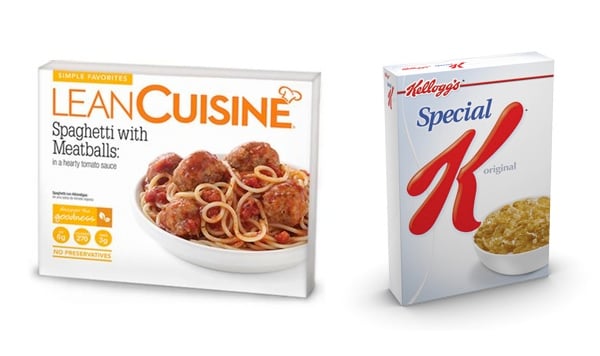With countless products making weight-loss claims, it’s tough figuring out which ones are actually telling the truth. Photographs courtesy of Special K and Lean Cuisine.
Once you make the decision to watch your weight, the universe seems to open up all sorts of foods products to you. There’s low-calorie ice cream, sugar-free chocolate—even fat-free water (yes, that just happened). Unfortunately, all of those in-your-face, weight-conscious food labels can be just as misleading as a fast food commercial.
We asked dietician Katherine Tallmadge, author of Diet Simple: 195 Mental Tricks, Substitutions, Habits & Inspirations and president of the DC Metro Area Dietetic Association, to help us sort the real from the fake. Here’s her take on a few eats that claim to help you on your quest to drop the pounds.
DO EAT . . .
• Lean Cuisine (“Simple Favorites” collection, for example)
Tallmadge loves these as an alternative to takeout, and says replacing takeout with healthy frozen meals like these twice a week can help you lose up to 18 pounds in a year. But, she warns, “They’re good mainly for the fact that they’re portioned out and low in negative nutrients like saturated fat and sodium. But they’re also not as high in beneficial nutrients as they could be, and many of them don’t include fruit or vegetables.” As expected, nothing beats a veggie-filled home-cooked meal.
• Weight-Watchers’ Smart Ones double fudge cake
This one’s for the sweet tooths—we found a dessert Tallmadge says you can potentially enjoy every day. At just 140 calories, perfectly portioned, and made with real chocolate, it’s a great way to indulge without blowing your diet. “It’s so low-cal you can get away with eating it daily, as long as sweets aren’t more than 10 percent of your daily nutrition,” she says.
• Diet Coke
Diet sodas are a viable option because they soothe sugar cravings and help you feel full without packing on calories. “You’d have to drink gallons of diet soda to get to harmful levels, but I wouldn’t recommend having more than one a day,” Tallmadge says, although she confesses Vernor’s diet ginger ale is one of her own weaknesses.
• Organic Soy Milk
“I can’t say enough positive things about soy milk,” our expert says. “It’s heart-healthy and may protect against certain cancers, and people love the smooth, rich texture and flavor.” When it comes to (low-fat) dairy versus (whole) soy, the two are comparable—dairy has nutritional benefits that soy doesn’t, and vice versa. And we have it on good authority that soy makes for a mean smoothie or hot cocoa.
DON’T EAT . . .
• (Original) Special K cereal
Here’s a good example of why it’s important to read the whole label and not just the nutrition facts. A look at the ingredients list reveals that most of Special K’s nutrients are added, instead of naturally occurring in ingredients such as whole grain (which Special K doesn’t include). “It’s a very processed food—the ingredient list is pretty long,” says Tallmadge. “Whole grains like oats should be the first and most predominant ingredient, and the list should be short and contain ingredients you can identify.” As a rule of thumb, ingredients are listed in order of prominence, so if sugar is number two or three, you should steer clear.
• Vitaminwater
“Such a ridiculous product and a waste of money!” Tallmadge exclaims. “It’s water fortified with vitamins—there’s no evidence of value, and it may actually be harmful.” Enough said.
• Nature Valley Oats ’n’ Honey granola bar
Yes, granola bars are healthy (when made of real grains, nuts, and fruit), but they’re for energy, not weight loss. In fact, you could be gaining weight if they’re your go-to snack. “They’re very high in calories for the amount you’re getting—you get a small amount of satisfaction for a large number of calories,” Tallmadge explains. Also, today’s average bars are often highly processed or high in sugar (it’s the second ingredient in the Oats ’n’ Honey bar).
Tallmadge’s general advice is this: “The most important concept when managing your weight is high nutrient content, low calorie content. You want food that gives a lot a bang for your buck—as much satisfaction, flavor, and nutrients for as few calories as possible.”



















